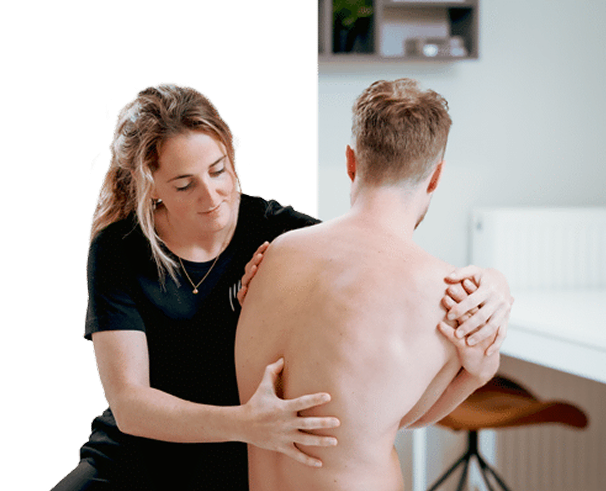Physical complaints
Shoulder Pain
Then chances are you are dealing with shoulder pain. These complaints can significantly interfere with your daily activities - from getting dressed to sleeping or riding a bike. Fortunately, in many cases something can be done about it. In this page we explain possible causes, common symptoms and what you can do to relieve the symptoms. You'll also discover how physical therapy can help you move freely again.
What are shoulder problems?
Shoulder pain is a collective term for pain or restrictions in the shoulder area. The pain can be nagging or sharp, continuous or occur with certain movements. Sometimes the pain radiates to your upper arm or even into your hand. In other cases, you may also have neck pain or headaches, especially if you have tense muscles.
A common cause is shoulder impingement a pinching of tendons or bursa in the shoulder joint. Stress, incorrect sleeping position, working at a computer or RSI can also contribute to neck and shoulder pain.
Symptoms of shoulder pain
Do you recognize one or more of these signs?
- Pain when lifting or twisting the arm
- Difficulty sleeping on the affected side
- Loss of strength or stiffness
- Radiation to arm, neck or shoulder blade
- Dizziness or headache due to tension in neck and shoulder
- Tingling or numbness in hand or fingers
Some people also experience symptoms after a fall or accident, or have chronic shoulder pain due to long-term overuse or improper work posture.
Causes of shoulder pain
There are several factors that can contribute to shoulder pain. The most common are:
1. Overexertion and RSI
Long-term repetitive motions – such as working with a mouse or overhead lifting – can lead to RSI shoulder pain or shoulder pain caused by stress. Think of people who sit at a computer a lot or work in healthcare.
2. Wrong posture or sleeping position
Improper posture while working or sleeping, or a poor pillow or mattress, can cause symptoms. An orthopedic pillow or pillow for neck and shoulder pain can provide relief. The best sleeping position for shoulder pain is also important.
3. Wear and osteoarthritis
With osteoarthritis in the shoulder, the cartilage in the joint is worn down, causing pain and stiffness. These symptoms often increase with age.
4. Trauma or fall
An accident or fall can lead to traumatic shoulder problems, such as a torn tendon or broken collarbone.
5. Medical causes
Conditions such as endometriosis, stress, or even incorrect cycling posture can also contribute to pain symptoms.
What can you do yourself?
Watch your posture
Make sure you have a good ergonomic workstation, especially if you spend a lot of time at a computer. Use an ergonomic mouse for shoulder problems and make sure your monitor is at eye level.
Use the right pillow and mattress
A good pillow and mattress can help. For example, consider a pillow side sleeper for shoulder pain or a pillow for neck and shoulder pain. Your mattress also plays a role in nighttime complaints.
Exercise regularly
Prevent stiffening by moving daily. Alternate sitting with walking or light stretching exercises.
Do targeted exercises
With exercises, you can strengthen your muscles and make them more flexible. Consider:
- Exercises for shoulder pain home doctor
- Exercises for neck and shoulder pain
- Stretching exercises for the shoulder muscles
- Stabilizing exercises for the shoulder joint
Ask your physical therapist for an exercise regimen that fits your situation.
What can a physical therapist do for you?
At The Physio Man we always look at the whole: posture, muscles, joints and your lifestyle. During the intake we map out your complaints and draw up a personal treatment plan.
Depending on your situation, we may treat with:
- Exercise therapy for shoulder pain
- Massage or manual therapy
- Dry needling for tense muscles
- Mobilizations to improve mobility
- Advice on posture, cushion or workstation
- Counseling for chronic or persistent shoulder pain
We can also guide you well with specific complaints such as shoulder impingement, radiation to arm or after a fall.
Frequently Asked Questions
Which pillow is best for shoulder pain?
An ergonomic pillow that properly supports your head and neck. For side sleepers, a firmer, higher pillow often works better. Consider an orthopedic pillow for shoulder problems.
Can stress cause shoulder pain?
Yes, tension often settles in the neck and shoulder muscles. This can lead to pain, stiffness and even headaches or dizziness.
What if I have been suffering for a long time?
Then we speak of long-term or chronic shoulder pain. Physical therapy can help strengthen your muscles, reduce pain and prevent recurrence.
Do you recognize these complaints?
Don’t let shoulder pain rule your day. Whether you are just experiencing symptoms or have been struggling with a stiff shoulder for years, our physical therapists are here for you with personal guidance and effective treatments.
Make an appointment at The Physio Man today and work toward a smooth, pain-free recovery.
Share this article:
Share this article:


